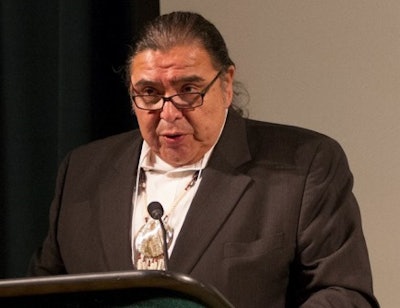 Marshall McKay, chairman of the Yocha Dehe Wintun Nation Tribal Council, speaks at the 28th Annual California Indian Conference and Gathering at California State University, Sacramento. (photo courtesy of Sacramento State/Steve McKay)
Marshall McKay, chairman of the Yocha Dehe Wintun Nation Tribal Council, speaks at the 28th Annual California Indian Conference and Gathering at California State University, Sacramento. (photo courtesy of Sacramento State/Steve McKay)With the endorsement of more than 40 California Indian nations and organizations, a new nonprofit tribal college will open in northern California in 2014 with the aim of serving American Indian students from the state.
Last week, Marshall McKay, chairman of the Yocha Dehe Wintun Nation, announced plans for what is known as the California Tribal College during a statewide Indian nations conference at the California State University, Sacramento campus. While planning for the new school has been under way since 2009, McKay confirmed that tribal college development efforts are “well on [their] way to making this dream become a reality” during a keynote speech for more than 200 representatives from California Indian nations, higher education institutions, local organizations and news organizations.
“The Yocha Dehe spearheaded an initiative to establish a California Tribal College several years ago in this great state where we have the largest populations of Native Americans and not one functioning tribal college,” McKay told conference attendees.
Next year, “we will finally see California add an accredited tribal college to the list of 37 others in this country,” he added.
McKay chairs an interim board of regents that includes other members from Yocha Dehe and representatives from the Little River Band of Pomo Indians, the Morongo Band of Mission Indians and the Rincon Band of Luiseño Indians. He said the California Tribal College, which will offer undergraduate degrees and certificate programs, will place an emphasis on courses in American Indian culture, languages and government.
“There is nothing more important for native people and our tribal futures than the education of our young people,” said McKay. “Our strength depends upon educating our next generations in the history, language and government of our tribes.”
California is home to the nation’s largest group of state residents who are of American Indian or Alaskan Native descent. The 2010 U.S. Census estimates that more than 723,000 American Indians and Alaskan Natives live in California. A total of 111 federally-recognized American Indian tribes are based in the state, according to officials.
From 1975 to 2005, California Indians had access to D-Q University, formerly the state’s only tribal college. The school closed down after losing its accreditation following years of internal conflict and financial problems.
Marilyn Delgado, director of the California Tribal College, told Diverse it has yet to be determined whether the new college will be a two- or four-year undergraduate institution. She said that launching the tribal college will enable educators to help address the wide diversity of American Indian youth in California.
“We are a state with the highest number of Native Americans and two-thirds of those people are not from California tribes. We have the largest Native American population, yet we do not have one tribal college,” Delgado said.
“A lot of our native youth in California have difficulty accessing tribal colleges in other states, or accessing college,” continued Delgado. “They don’t feel comfortable in many mainstream colleges and so that’s why we’ve pushed this initiative.”
Tishmall Turner, the tribal liaison for California State University, San Marcos, told The Sacramento Bee there’s considerable need for new college opportunities for American Indian high school graduates. “The number of Native American youth attending California colleges has declined over the last decade,” she said. “Our goal is to service as many as possible.”
Delgado said completion of a tribal college feasibility study in early 2014 will answer a number of questions over how the school will be developed, including whether it will be a two- or four-year school and where it’s likely to be established. McKay has indicated that the Sacramento region would be a logical choice for the new college given the proximity to the Sacramento airport and the availability of suitable real estate, according to The Sacramento Bee.
The project has garnered at least two significant donations. The investment banking firm of Goldman Sachs has donated $290,000, and the Seven Post Investment firm has pledged $150,000, according to tribal college officials.















